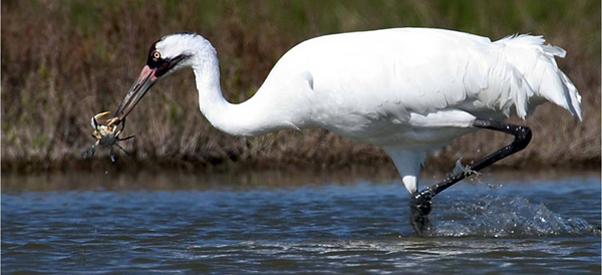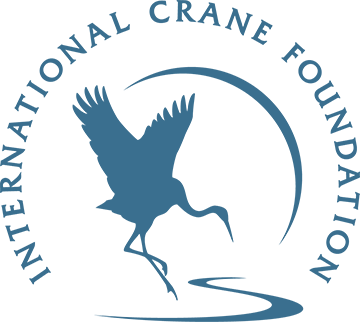Media contact: Kate Fitzwilliams, ICF Marketing/PR Specialist, 608-356-9462 ext. 147

Both Whooping Cranes and blue crabs depend on the health of the Guadalupe and San Antonio Rivers, which
feed freshwater into the coastal marshes along the Gulf of Mexico. Photo by Mike Sloat
 The International Crane Foundation (ICF) is whooping it up after a historic Court ruling in favor of the citizen suit filed by The Aransas Project (TAP) against the Texas Commission on Environmental Quality (TCEQ) to protect the last naturally migrating flock of Whooping Cranes. On March 10, 2010, TAP filed a lawsuit against several officials of the TCEQ for illegal harm and harassment of Whooping Cranes at and adjacent to Aransas National Wildlife Refuge, in violation of the Endangered Species Act. The case went to trial before the United States District Court for the Southern District of Texas in December 2011. Today’s historic decision by United States District Judge Janis Graham Jack comes three years to the day after the original filing.
The International Crane Foundation (ICF) is whooping it up after a historic Court ruling in favor of the citizen suit filed by The Aransas Project (TAP) against the Texas Commission on Environmental Quality (TCEQ) to protect the last naturally migrating flock of Whooping Cranes. On March 10, 2010, TAP filed a lawsuit against several officials of the TCEQ for illegal harm and harassment of Whooping Cranes at and adjacent to Aransas National Wildlife Refuge, in violation of the Endangered Species Act. The case went to trial before the United States District Court for the Southern District of Texas in December 2011. Today’s historic decision by United States District Judge Janis Graham Jack comes three years to the day after the original filing.
TAP contended that the TCEQ allowed too much water to be removed from the Guadalupe and San Antonio Rivers, such that the bay salinity was changed beyond what drought would cause, resulting in reduced fresh drinking water and food supply that ultimately caused the death of at least 23 Whooping Cranes during the winter of 2008 – 2009. Through 10 expert witnesses, including ICF Co-founder Dr. George Archibald, and five citizen witnesses, TAP wove together the complex evidence that links the fate of Whooping Cranes – and all who depend on the bays for their livelihoods – to freshwater inflows.
“The ruling on this case is outstanding. Hearing about the plight of the Whooping Cranes when I was a child was what inspired me to save these incredible birds. As the first witness in this trial, I spent three hours talking about the importance of fresh water inflows to coastal wetlands and how it relates to the survival of Whooping Cranes,” ICF Co-founder Dr. George Archibald said.
The Court ruled that the TCEQ has violated the Endangered Species Act and continues to do so through their water management practices – including the decision to not monitor domestic and livestock water rights users or to exercise emergency powers available to protect endangered Whooping Cranes. The Court ordered that the TCEQ cannot approve or grant new water permits affecting the Guadalupe or San Antonio Rivers until the State of Texas provides reasonable assurances to the Court that such permits will not harm Whooping Cranes in violation of the Endangered Species Act. Within 30 days, the TCEQ must seek an “Incidental Take Permit” that requires development of a Habitat Conservation Plan. The Habitat Conservation Plan must include conservation measures designed to minimize and mitigate the impacts of taking species listed under the Act.
“ICF’s approach to the conservation of cranes, and the wetlands and river systems on which they depend, has always focused on bringing people together to find win-win solutions for water sharing. We applaud this momentous decision as the best way to ensure reasonable, sustainable, and environmentally-sound water management in the river basin for people and wildlife,” ICF President and CEO Dr. Rich Beilfuss said.
Since 2010, ICF has undertaken new research and outreach activities in Texas under the leadership of Dr. Elizabeth Smith, ICF Whooping Crane Conservation Biologist, to support the long-term survival of Whooping Cranes on their wintering grounds. ICF will be heavily involved in the development and ultimately the implementation of a Habitat Conservation Plan to better ensure the future of Whooping Cranes on their wintering grounds in Texas. Learn more about ICF’s work in Texas.
